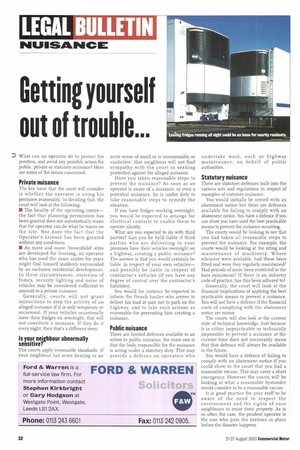Getting yourself , [T41 out of trouble... I What can
Page 32

If you've noticed an error in this article please click here to report it so we can fix it.
an operator do to protect his position, and avoid any possible action for public, private or statutory nuisance? Here are some of the issues concerned, Private nuisance
The key issue that the court will consider is whether the operator is using his premises reasonably. In deciding that, the court will look at the following; • The locality of the operating centre— the fact that planning permission has been granted does not automatically mean that the operator can do what he wants on the site. Nor does the fact that the Operator's Licence has been granted without any conditions.
• As more and more "brownfield' sites are developed for housing, an operator who has used the same centre for years might find himself suddenly surrounded by an exclusive residential development. In these circumstances, emission of fumes, security lighting and noise of vehicles may be considered sufficient to amount to a private nuisance.
Generally, courts will not grant injunctions to stop the activity of an alleged nuisance if it is only temporary or occasional. If your vehicles occasionally leave their fridges on overnight, that will not constitute a nuisance. If they do it every night, then that's a different story.
Is your neighbour abnormally sensitive?
The courts apply reasonable standards. If your neighbour has acute hearing or an acute sense of smell or is unreasonable or vindictive, that neighbour will not find sympathy with the court in seeking protection against the alleged nuisance.
Have you taken reasonable steps to prevent the nuisance? As soon as an operator is aware of a nuisance, or even a potential nuisance, he is under duty to take reasonable steps to remedy the situation.
If you have fridges working overnight, you would be expected to arrange for electrical contacts to enable them to operate silently.
What are you expected to do with third parties? Can you be held liable if third parties who are delivering to your premises have their vehicles overnight on a highway, creating a public nuisance? The answer is that you would certainly be liable in respect of your own vehicles— and possibly be liable in respect of contractor's vehicles (if you have any degree of control over the contractor's You would for instance be expected to inform the French haulier who arrives to deliver his load at 3am not to park on the highway, and to take such actions as reasonable for preventing him creating a nuisance.
Public nuisance There are limited defences available to an action in public nuisance; the main one is that the body responsible for the nuisance is acting under a statutory duty. This may provide a defence on operators who
undertake work, such as highway maintenance, on behalf of public authorities.
Statutory nuisance
There are statutory defences built into the various acts and regulations in respect of examples of statutory nuisance.
You would initially be served with an abatement notice but there are defences available for failing to comply with an abatement notice. You have a defence if you can show you have used the best practicable means to prevent the nuisance occurring.
The courts would be looking to see that you had taken all reasonable steps to prevent the nuisance. For example, the courts would be looking at the siting and maintenance of machinery. Where silencers were available, had these been fitted and were they regularly maintained? Had periods of noise been restricted to the bare minimum? If there is an industry code of practice, has this been adhered to?
Generally, the court will look at the financial implications of applying the best practicable means to prevent a nuisance. You will not have a defence if the financial costs of complying with the abatement notice are minor.
The courts will also look at the current state of technical knowledge. Just because it is either impracticable or technically impossible to prevent a nuisance at the current time does not necessarily mean that that defence will always be available in the future.
You would have a defence of failing to comply with an abatement notice if you could show to the court that you had a reasonable excuse. This may cover a short emergency. However the courts will be looking at what a reasonable bystander would consider to be a reasonable excuse.
It is good practice for your staff to be aware of the need to respect the environment and the rights of your neighbours to enjoy their property. As is so often the case, the prudent operator is the one who puts the systems in place before the disaster happens.
































































































































































